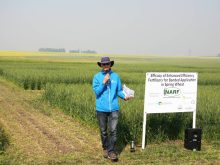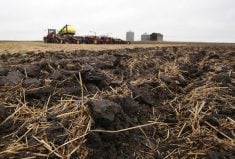SASKATOON — Biofuel consumption has surged following implementation of Canada’s Clean Fuel Regulations, according to a new report.
Ethanol consumption was up 13 per cent in 2023 to four billion litres per year, renewable diesel consumption more than doubled to 1.2 billion litres and biodiesel was up 14 per cent to 530 million litres.
Related stories:
Those numbers come from the Biofuels in Canada 2024 report prepared by Navius Research for Advanced Biofuels Canada (ABFC).
Read Also

Food exporters urged to ease reliance on U.S.
Farm Credit Canada says there is a $12 billion opportunity in diversifying food and beverage exports to markets other than the United States.
“After more than a decade of steady, modest growth in biofuel use, 2023 saw a 25 per cent surge in demand for clean fuels,” ABFC president Ian Thomson said in a news release.
The federal Clean Fuel Regulations (CFR) was the big driver, but it was aided by a 28 per cent increase in biofuel use under British Columbia’s Low Carbon Fuel Standard and a 52 per cent increase in Quebec’s use due to the implementation of its low carbon fuel regulation.
Biofuel content was 9.44 per cent in gasoline and 6.23 per cent in diesel, up 10 per cent and 68 percent respectively, from 2022 levels.
Biofuel was responsible for 86 per cent of Canada’s transportation-related greenhouse gas emission reductions in 2023, which totaled 11.4 million tonnes.
Ethanol delivered 55 per cent lower carbon emissions than gasoline while biomass-based diesel provided an 87 per cent reduction compared to diesel.
Biofuel blending lowered wholesale gasoline costs by $0.055 per litre or $1 billion in 2023. However, it raised wholesale diesel costs by $0.051 per litre or $1.5 billion.
At the retail level, the cost of both types of biofuel was higher than their conventional counterparts due to “over-taxation” caused by taxing biofuel based on volume rather than energy content, according to the report.
“Biofuels are already saving most Canadians money at the pump, but these savings could be even greater with fair taxation,” said Thomson.
However, not everybody is pumped about biofuel.
The National Farmers Union recently produced a report highly critical of the next big offering from the biofuel sector — sustainable aviation fuel (SAF).
The report notes that SAF will initially be produced using grains and oilseeds as a feedstock and then transition to agricultural residues such as straw and corn stover and then to energy crops such as fast-growing grasses and trees.
All that additional farm-sourced biomass will require nitrogen fertilizer, resulting in an increase in on-farm greenhouse gas emissions.
“The aviation industry’s climate solution creates an agricultural emissions problem,” Darrin Qualman, the NFU’s director of climate crisis policy and action, said in a news release.
He also noted that the removal of “enormous quantities” of biomass will slow or reverse farmers’ attempts to sequester carbon and build soil health through reduced tillage.
The NFU also worries about “hundreds of billions” of aviation sector fuel dollars flowing into the agriculture sector to compete with food consumers.
“SAF may come to stand for sacrificing affordable food,” said Qualman.
Projected fuel demand from the aviation industry will reach two-thirds of a trillion litres per year by 2050, with much of that being produced from agricultural feedstocks.
“It is reckless to impose such demands on a global farmland base that will be pressed to feed billions more people and, simultaneously, hit ever harder by climate impacts,” he said.
Contact sean.pratt@producer.com
















